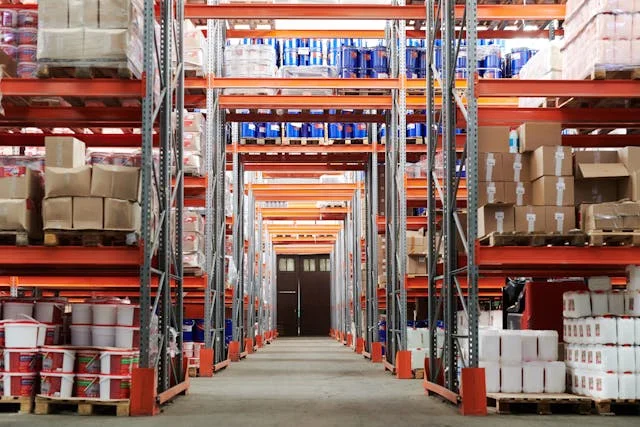Both Warehouse and Storage are frequently used as synonyms, however, these two terms differ from each other. The main difference between warehousing and storage services is that the first one refers to long-term storage, while the second term is more of a temporary solution. Of course, there are more differences, especially when talking about facility capacity and services offered.
What is Warehousing?
Warehousing is a storage solution for goods to be stored for a long time. This is where products are stored with the care required and during an agreed time.

Warehousing storage includes many aspects such as storage unit management, so that the goods can then be packed and distributed, and also everything that has to do with registering information, handling these goods, and transport.
Specialized equipment is required for the most part, in a warehouse facility, such as conveyor belts to support tasks held inside.
Functions of warehousing storage facilities
Many other tasks can take place at the warehouse storage facilities, such as inventory and quality management. At EP Logistics we’re always striving to offer your business the most complete service you can find and that’s why we dedicate our time and energy to covering your needs through:
- Foreign Trade Zone (FTZ). We offer storage convenience when storing goods located outside United States customs territory.
- Pick and Pack. We manage everything related to transporting your placed orders. This is very useful for online stores, for example.
- Order Fulfillment. Our personnel schedules and delivers to your clients.
- Merge in Transit. We enhance the efficacy of your supply chain by combining different shipments into one delivery.
What is Storage?
Storage is a more general term that refers to depositing the goods for a short term and usually at a smaller scale. Small area rooms or fridges can be used depending on the type of products being stored. A difference between a warehouse storage facility and a storage is that in the first one specialized implements are required, while in the latter these tools are not necessarily needed or required.
Types of storage
- Self-storage units. These are individual units that are leased as a means to store excess inventory or equipment.
- Cross-dock facilities: Specifically designed for the efficient transfer of goods directly from incoming to outgoing vehicles, minimizing storage time and streamlining logistics operations.
- Climate-controlled storage. Existent in both storage and warehouse, this system allows for the storing of delicate perishable goods such as food, under a climate-controlled environment.
- Mobile storage. Portable units that are leased and transported to the location where a company needs them.
- Specialized storage. A type of storage used for items that require special care. Some companies store for example art, important documents, or electronics that need a specific environment.
The Differences Between Warehousing and Storage
As mentioned, there are many differences between warehousing and storage, including their functions, storage time frame, area size, and access to each one.
Functionality
One of the key differences between warehousing and storage is that storage facilities are spaces meant to keep goods safe, but that’s where the service ends. However, in warehousing, additional services are offered such as inventory management and shipping and delivery advantages.
Duration
When choosing warehousing, the storage term is usually longer, these spaces are commonly used to store goods that aren’t needed often, such as seasonal items.
On the other side, storage implies a shorter storage term for the good. These are stored only for the time in between them being shipped or delivered to the buyer.
Capacity
Generally, when thinking about warehousing, we’re talking about a larger quantity of goods or goods with bigger dimensions, which is why the spaces needed must be roomy enough to allow easier access and better movement.
A storage facility, on the other hand, is usually a place with higher security, but how roomy or optimized the space is, is not as important.
Cost
Another difference between warehousing and storage is the cost of their service. Prices vary according to different factors such as storage requirements and specifications, storage time, additional services, and merchandise size, among others.
Usually, warehousing storage is more expensive because it offers a bigger space and additional services besides just the storage. It also requires a deeper management of the goods, their transport, and systematization.
Warehousing frequently offers services that perfectly complement the storage, like packing and transporting of the goods. The amount of elements requested might determine which services are added to the catalog.
Regular storage offers only that, without additional services, and the storage will vary according to the merchandise and the special care it might need.
What Types Of Businesses Use Warehouse Storage?
Due to the differences between warehousing and storage, different companies belonging to a variety of industry sectors will choose one or another. Among these companies we can find:
- Manufacturing Sectors. Refineries, paper or food industries require a warehouse to finish processing and store their goods.
- E-Commerce Sectors. Every warehousing service offered by companies like EP Logistics is essential for e-commerce. This allows them to minimize errors and to have more efficient deliveries.
- Shipping And Cargo Companies. Products these companies transport require a space for them to be stored and delivered to their final destination.
The differences between warehousing and storage allow you to choose the option that best suits your business needs. If you only require storage, that’s the way to go.
However, if you require a more extensive service, the best option will be warehousing.
At EP Logistics, we can guide you and offer you the best warehousing service for your business. Contact us!



